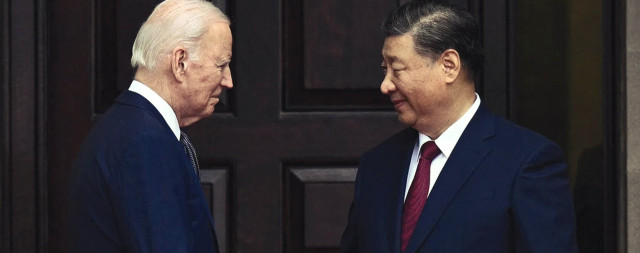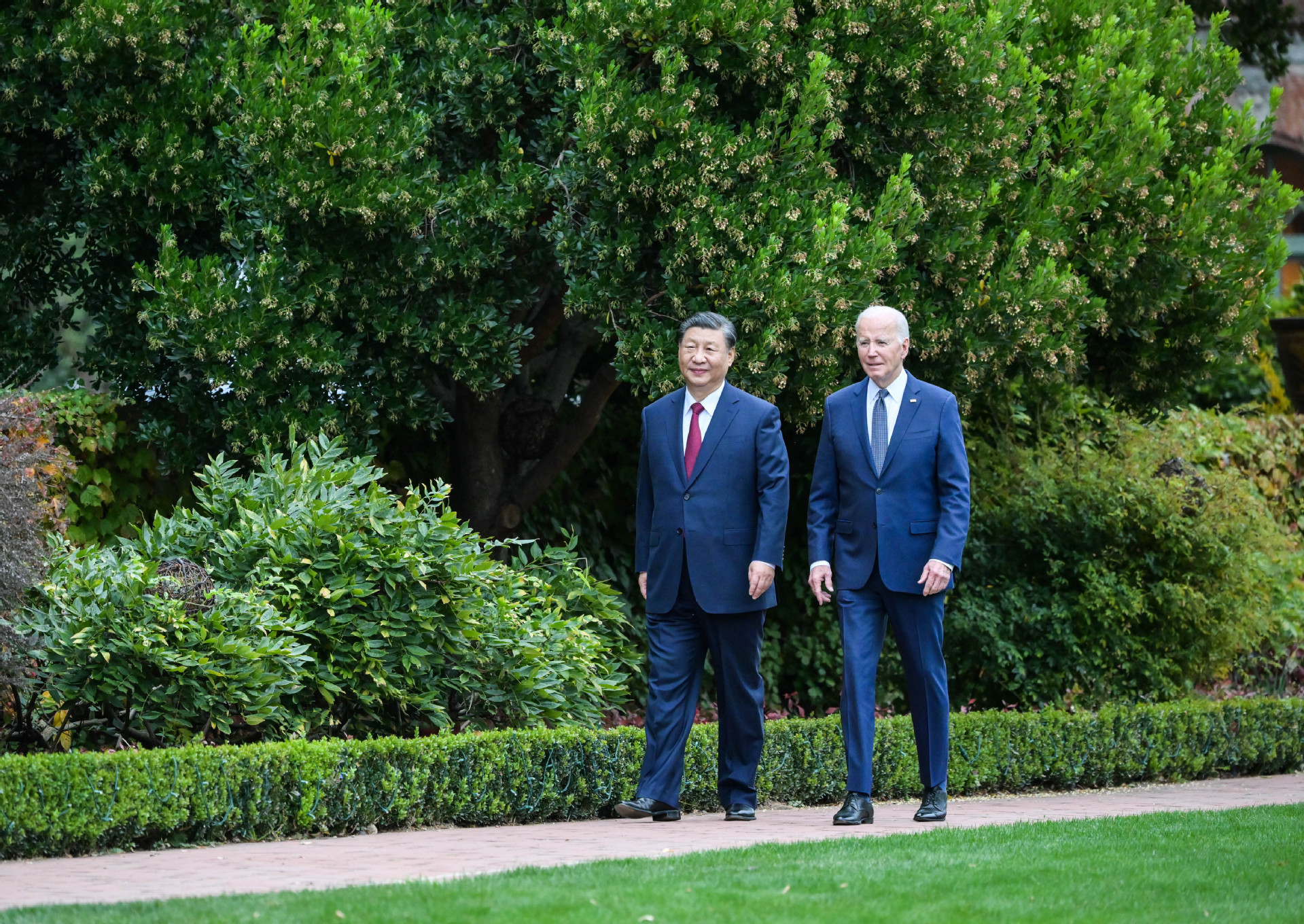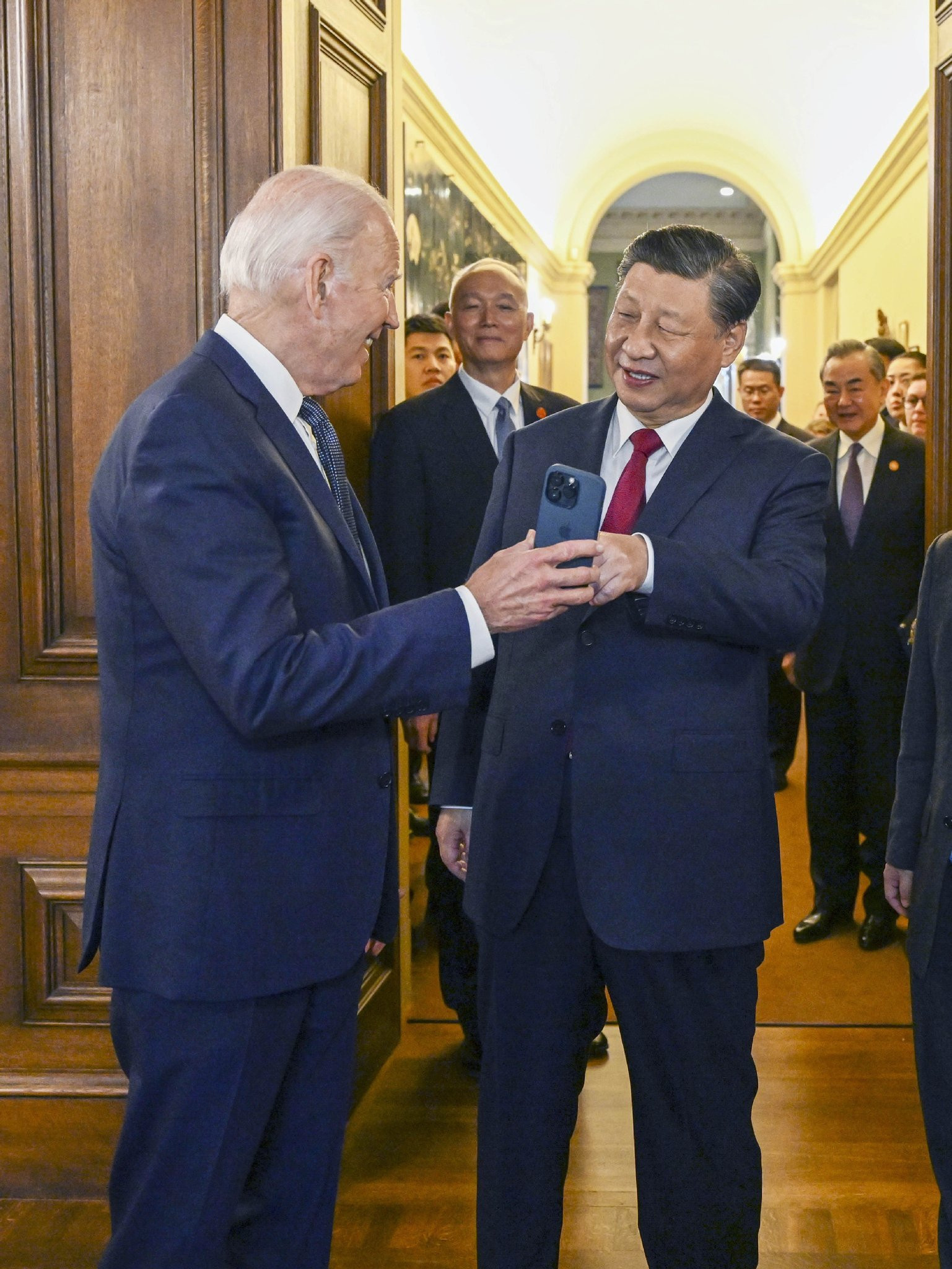Beyond handshakes & smiles: takeaways from Xi-Biden summit
There was little forward movement on the underlying factors fuelling perilous rivalry between the two superpowers

Exactly one year and one day after their last meeting on the fringes of the G20 summit in Bali, Indonesia, the leaders of the world’s two biggest economies met again on November 15, this time on the sidelines of the Asia-Pacific Economic Cooperation (APEC) summit in San Francesco, California. The Bali summit between US President Joe Biden and his Chinese counterpart Xi Jinping produced only a handshake photo-op as the two leaders couldn’t ease tensions over the highly flammable issues, particularly Taiwan, South China Sea, trade practices, and US restrictions on Chinese technology. The US-China relations atrophied to a near-historic low after a provocative visit to Taiwan by US House of Representatives Speaker Nancy Pelosi incensed China which responded by shutting down eight formal communication channels with Washington, including on military-to-military talks.
Though like the Bali summit, the four-hour long “candid and in-depth” talks at a secluded suburban San Francisco estate also did not produce a joint statement, it did yield some positive outcomes. Before going into summit, Biden said he would define success as getting back on a “normal course” with China that include “corresponding, being able to pick up the phone and talk to one another if there’s a crisis, being able to make sure that our militaries still have contact with one another.” If this was the objective, then the two leaders managed to achieve more than that. They agreed to 1) resume high-level military-to-military communication; 2) establish a working group on counter-narcotics cooperation; and 3) establish governmental level talks on artificial intelligence.
This was a diplomatic breakthrough given the low expectations from the summit and the strain in the complicated US-China relationship. Going a step farther, President Xi proposed a “new vision” in bilateral ties based on five pillars that include jointly developing a right perception; managing disagreements effectively; advancing mutually beneficial cooperation; shouldering responsibilities as major countries; and promoting people-to-people exchanges. Biden agreed that with stable relations they could prevent conflict, manage differences and cooperate in areas of shared interest. He reaffirmed the five commitments he had made in Bali: the US doesn’t want a new Cold War; doesn’t seek to change China’s system; doesn’t seek to revitalise its alliances against China; doesn’t support ‘Taiwan independence’; and has no intention to have a conflict with China.
The Americans didn’t expect much from this summit. For them, the primary objective appeared to be restoring severed channels of communication, mainly through the military, because they fear “vital miscalculations on either side can cause real, real trouble with a country like China or any other major country.” The two militaries have had a number of perilous exchanges over the past year, primarily triggered by provocative manoeuvring by the American navy in the Taiwan Strait and South China Sea. Biden cannot afford to ignite another hot war at a time when his country is already embroiled in the Ukraine and Middle East conflicts.
Though the atmospherics and mood music of the summit was upbeat, there was little forward movement on the underlying factors stoking dangerous rivalry between the two superpowers. And their diverging approaches to diplomacy and global challenges remain evidently unchanged. While the US president betrayed a preference for selective interference, his Chinese counterpart pushed for a human community with a shared future in a peaceful multipolar world.
The readout of the Xi-Biden meeting released by the White House stated that the US president had emphasised that the US and China are in “competition.” Biden also noted that Washington would “continue to invest in the sources of American strength at home and align with allies and partners around the world,” even as he called for managing US-China competition “responsibly to prevent it from veering into conflict, confrontation, or a new Cold War.” In stark contrast, Xi emphasised that Planet Earth is big enough for the two countries to succeed. “Major-country competition cannot solve the problems facing China and the United States or the world,” he said. “The world is big enough to accommodate both countries, and one country’s success is an opportunity for the other.”
On X, formerly Twitter, Biden's official account posted "it's never been a good bet to bet against America".
My Administration will keep working to make sure our workers have what they need to out-compete China and everyone else.
— President Biden (@POTUS) November 18, 2023
As I’ve reminded other world leaders, it’s never been a good bet to bet against America.
That’s been true through our history – and it’s still true today.
"We have not always agreed. But our meetings are always candid, straightforward, and useful," the US president had tweeted earlier, referring to his meeting with Xi.
Mr. President, we have known each other for a long time.
— President Biden (@POTUS) November 16, 2023
We have not always agreed. But our meetings are always candid, straightforward, and useful.
Yesterday was no different.
Our nations may be in competition, but that doesn't mean we can't compete responsibly. pic.twitter.com/550epPY91b
Since the disintegration of the Soviet Union, the US considers itself on a divine mission to remodel the world in its own image by exporting its liberal values and systems, leaving no room for independent choices. In its quest to ensure its own primacy in the world order, it has employed every tool at its disposal – from diplomatic and economic to military force – to bring nations and governments looking to chart their own path to development, in line with its own hegemonic aims.
Over the past three decades, partnership with the US has been presented to would-be allies as a zero-sum option. Through statements like Bush’s infamous “you are either with us or against us,” and by labelling as “rogue” any nation not aligned with its agenda, its foreign policy has often had a divisive effect on regions, evident in lingering conflicts that continue to flare up every now and then.
In contrast, China’s diplomacy has been based on mutual benefit and development. Through grand interconnecting infrastructure schemes and investment in developing economies, Beijing has up till now sought to bring about a rather “harmonious” global order that is marked by principles of non-interference and tolerance for other systems and values. Indeed, while the US continues to warn against “exploitation” by China through its investment, many experts have noted that any critiques against Beijing’s economic forays in the developing world have less to do with China and more to do with capitalism itself. The readout of the Xi-Biden summit shared by China’s foreign ministry illustrated this stark contrast in the two nations’ philosophies.

“China and the United States are faced with two options in the era of global transformations unseen in a century: One is to enhance solidarity and cooperation and join hands to meet global challenges and promote global security and prosperity; and the other is to cling to the zero-sum mentality, provoke rivalry and confrontation, and drive the world toward turmoil and division,” the Chinese version of the readout quoted Xi as telling Biden.
Stressing that choosing between these two paths will decide the fate of humanity and our planet, Xi argued for China and the US turning their back on each other is not an option. Equally unrealistic, according to Xi, is for one side to remodel the other – a stance that gained further poignancy when Biden endangered the bonhomie before and during the meeting through ill-advised remarks.
At the end of a solo presser after the summit, Biden admitted that he had not changed his view that the Chinese president was effectively a dictator. “Look, he is. He’s a dictator in the sense that he's a guy who runs a country that is a communist country that's based on a form of government totally different than ours,” Biden said. Even if off-the-cuff, Biden’s insinuation betrayed America’s superpower hubris and condescending diplomacy. It could have scuppered the summit, but China’s foreign ministry chose to brush it aside as “irresponsible political manipulation”.
Xi, according to the Chinese readout, noted that “mutual respect, peaceful coexistence and win-win cooperation” were the lessons learned from both half a century of China-US ties as well as conflicts between major polities throughout the history of the world. However, a day after the meeting, Biden told executives at the APEC summit that the US still has “real differences with Beijing”. His comments, along with the language of the White House readout, revealed a persistent paranoia dominates US foreign policy.

On the thorniest issue of Taiwan, the US remains ambivalent. Washington continues to arm the island to the teeth even though publicly it recognises Taiwan as part of China. At the summit, Biden argued for maintaining status quo on Taiwan, while Xi favoured moving towards a ‘resolution’. The US president called for restraint in China’s use of military activity in and around the Taiwan Strait. The Chinese leader made it clear to Biden that the Taiwan question remains the “most important and most sensitive” issue in China-US relations. “The US side should take real actions to honour its commitment of not supporting ‘Taiwan independence’, stop arming Taiwan, and support China’s peaceful reunification,” Xi said. “China will realise reunification, and this is unstoppable.”
Paradoxically, while underscoring the “universality of human rights and the responsibility of all nations to respect their international human rights commitments”, and calling China out for its alleged transgressions in “Xinjiang, Tibet, and Hong Kong”, Biden reiterated US support for Israel’s ‘right to defend itself’ at a time when Tel Aviv’s brutal atrocities in Gaza are eliciting horror and condemnation from the public in the East and West.
In the weeks leading up to the Xi-Biden meeting, as the UK convened a conference on AI safety and security, Washington’s move to restrict China from certain chips and related technologies garnered much discussion. During this week’s meeting, while Biden discussed the need to address the risks of advanced AI systems through government-to-government talks with Beijing, he emphasised that the US will continue to take necessary actions to prevent advanced US technologies from being used to undermine its own security.
At the San Francesco summit, President Xi raised the US export control, investment screening and unilateral sanctions which hurt his country’s legitimate interests. “Stifling China’s technological progress is nothing but a move to contain China’s high-quality development and deprive the Chinese people of their right to development,” he said. “China’s development and growth, driven by its own inherent logic, will not be stopped by external forces.”
Anti-imperialists claim that the West became rich by colonising others and plundering their riches. Today, the US pursues a policy of neo-colonialism as it promotes a so-called rule-based world order to maintain its hegemony. President Xi, meanwhile, sought to explain that that China has no intention of taking the old path of colonisation and plundering, or the wrong path of seeking hegemony with growing strength. “It does not export its ideology. It has no plan to surpass or unseat the United States. Likewise, the United States should not scheme to suppress and contain China,” the Chinese president was quoted as saying.
On the ongoing global conflicts, particularly Gaza and Ukraine, it appears Biden was the one who did all the talking. The Chinese foreign ministry readout didn’t have any mention of these talking points. After failing to win most of the world to its side, Washington might have realised two things: first, given its partisan approach to such conflicts, it no longer has the clout to influence a resolution alone, and second, it does not have the stamina for now to engage in Ukraine and Gaza, much less open a third front.
Recent reports have suggested that at least some quarters in Washington have begun exploring the possibility of a truce between Ukraine and Russia, and many Western observers have all but abandoned the notion of a Ukrainian victory. At the same time, the public in the US and the rest of the West seems to have lost their patience with global intervention, as evident from the resistance encountered during attempts to clear a new aid package for Ukraine. Social media has also, for the first time, amplified Israel’s atrocities in Gaza so much so that the younger segment of Western society has shifted against support for Tel Aviv.
That said, the US obsession with ‘competition’, if not outright conflict with China, remains a point of concern and signals archaic thinking. While China, intelligently, promotes a global philosophy of non-interference and collaboration, rather than competition, the US seems set on choosing ‘winners and losers’ according to its singular geopolitical objectives. Robust normalisation between the two global powers would remain a distant dream without a paradigm shift in the US foreign policy.



1726734110-0/BeFunky-collage-(10)1726734110-0-208x130.webp)















COMMENTS
Comments are moderated and generally will be posted if they are on-topic and not abusive.
For more information, please see our Comments FAQ